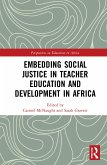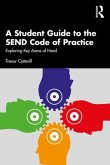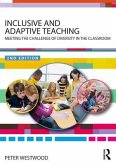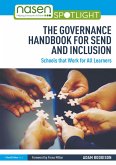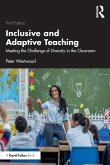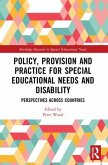Drawing on research carried out in partnership with schoolteachers, school leaders, and student teachers, this book presents cutting-edge research on teacher education and how it can be used to catalyse the development of inclusive practice in mainstream schools and classrooms.
Theoretically robust and guided by the author's near 40 years of experience as an educationalist, this research-informed book offers an account of the practices and principles that underpin effective teacher education for special educational needs and disability (SEND). Chapters propose transformative approaches towards effective teacher education whilst also exploring the dangers of de-intellectualisation to the promotion of inclusive practices; in doing so, this book reasserts the indispensability of intellectual labour to the development of the inclusive teacher. Ultimately, this book argues that teacher education curricula must include critical-theoretical work and reflexive projects, offering intellectually rich and critical approaches whilst also defending the important role that higher education plays in the context of partnership with schools.
At a time when urgent questions around equity are being discussed on the global stage, this book will be of interest to scholars, researchers, and postgraduate students in the fields of inclusion and special education, teacher education, and the theory of education more broadly. Teacher educators and policymakers working towards equitable, quality education for all will also find the volume of use.
Theoretically robust and guided by the author's near 40 years of experience as an educationalist, this research-informed book offers an account of the practices and principles that underpin effective teacher education for special educational needs and disability (SEND). Chapters propose transformative approaches towards effective teacher education whilst also exploring the dangers of de-intellectualisation to the promotion of inclusive practices; in doing so, this book reasserts the indispensability of intellectual labour to the development of the inclusive teacher. Ultimately, this book argues that teacher education curricula must include critical-theoretical work and reflexive projects, offering intellectually rich and critical approaches whilst also defending the important role that higher education plays in the context of partnership with schools.
At a time when urgent questions around equity are being discussed on the global stage, this book will be of interest to scholars, researchers, and postgraduate students in the fields of inclusion and special education, teacher education, and the theory of education more broadly. Teacher educators and policymakers working towards equitable, quality education for all will also find the volume of use.
"This is an important book, full of rich insights, that presents a refreshing approach to addressing the challenges of inclusion by boldly engaging with complexity and advocating for the vital preparation of new teachers through navigating the historical, political, and practical hurdles they will face. In doing so, the book confronts the prevailing neoliberal culture that has marketised education, fragmented teacher agency, and standardised practices, thereby marginalising the most vulnerable in our schools. Grounded in research, Deborah thoughtfully emphasises the importance of recognising and reclaiming the intellectualisation of teacher preparation as an integral feature of higher education, highlighting the professional obligations required to support all children.
This book is therefore an essential read for anyone interested in thoughtful consideration of teacher development and inclusion as it offers important alternatives to the prevailing superficial orthodoxies that now exist. By advocating for the redesign and re-politicisation of teacher education Deborah offers important and intelligent insights to address urgent questions, offering a new model of inclusion education that emerges through an enriched curriculum capable of challenging the neoliberal discourses that currently perpetuates the inequalities in our education system."
David Spendlove, Associate Dean and Professor, Faculty of Humanities, Manchester Institute of Education, University of Manchester, UK.
"Effective Teacher Education for Inclusion provides a clear and critical overview of teacher education in England using historic and contemporary sources. It presents a convincing argument for the importance of collaborative critical enquiry and action research as a basis for the development of teaching professionals at all stages of their career. It also demonstrates how barriers to reflective practice have existed in our education systems for many years and continue to do so. You may not agree with everything Deborah Robinson has to say nor all of the solutions she proposes, but this book will certainly provoke your thinking about a fundamental educational issue. It will help you to understand why there need to be major shifts in policy if we are to transform our education systems in ways that can enable inclusive practice..."
Jonty Rix was a professor of Participation and Learning Support at the Open University and is now Emeritus professor, UK.
This book is therefore an essential read for anyone interested in thoughtful consideration of teacher development and inclusion as it offers important alternatives to the prevailing superficial orthodoxies that now exist. By advocating for the redesign and re-politicisation of teacher education Deborah offers important and intelligent insights to address urgent questions, offering a new model of inclusion education that emerges through an enriched curriculum capable of challenging the neoliberal discourses that currently perpetuates the inequalities in our education system."
David Spendlove, Associate Dean and Professor, Faculty of Humanities, Manchester Institute of Education, University of Manchester, UK.
"Effective Teacher Education for Inclusion provides a clear and critical overview of teacher education in England using historic and contemporary sources. It presents a convincing argument for the importance of collaborative critical enquiry and action research as a basis for the development of teaching professionals at all stages of their career. It also demonstrates how barriers to reflective practice have existed in our education systems for many years and continue to do so. You may not agree with everything Deborah Robinson has to say nor all of the solutions she proposes, but this book will certainly provoke your thinking about a fundamental educational issue. It will help you to understand why there need to be major shifts in policy if we are to transform our education systems in ways that can enable inclusive practice..."
Jonty Rix was a professor of Participation and Learning Support at the Open University and is now Emeritus professor, UK.


